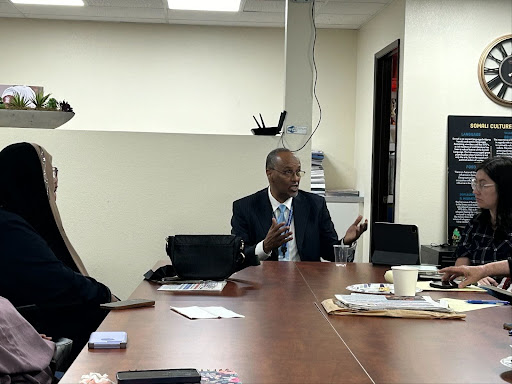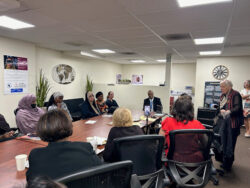
By Emily Kim Jenkins, Contributing Writer
Across America, asthma affects Black and Hispanic Americans disproportionately. According to the Asthma and Allergy Foundation of America, Black Americans are five times more likely to end up in the emergency room from asthma-related complications than White Americans. Black women are at a particularly high risk.
With inequities in healthcare access also plaguing communities of color, the outlook can feel grim. However, changes in Medi-Cal access could provide a new take on healthcare.
Hajara Lumumba’s daughter was born with wide-ranging health complications. From a rare genetic blood disorder to continuous coughing and struggling to breathe fully, Lumumba’s days and nights during her child’s earliest years were long and trying. As a low-income household new to San Diego from Congo, navigating the healthcare system was already a challenge – but when she met Carolina Festo, things started to change.
Festo, also born in Congo, came to San Diego in 2006. A determined worker, she immersed herself in public service, getting connected with Somali Family Service (SFS) and eventually becoming a Community Health Worker.
When Festo met Lumumba and heard of her daughter’s asthma, she was prepared to help in more ways than one. SFS offers an asthma mitigation program, which helps educate families in over ten languages on triggers and prevention, and can provide supplies such as air purifiers for free. These services are helpful by themselves, but patient advocacy from a Community Health Worker such as Festo can make this care even more meaningful.

“I didn’t know what to say or how to open up to people,” Lumumba said, beaming with pride. “But especially because of my sister here [Festo], she helped me so much, I can say anything.”
“[The asthma remediation program] was needed because we [had heard] from the community that people were suffering from asthma, and they don’t know what to do. And when they visit a doctor, they don’t give them time to explain how they feel,” Festo, who speaks three languages, said. “The language barrier is a big issue in the community.”
Community-based health providers were recently given the opportunity to expand their reach through CalAIM, a state program through the Department of Healthcare Services (DHCS) designed to reform Medi-Cal and make healthcare access more equitable. CalAIM, which stands for California Advancing and Innovating Medi-Cal, is a five-year reform plan of public health insurance. The plan stretches into 2027.
“The CalAIM program is changing Medi-Cal [as] we know of it, and that means that community-based organizations such as Somali Family Service now can provide some of those services that were limited to clinical hospitals,” said Ahmed Sahid, president of SFS. He also said the majority of their clients already are eligible for these services to be covered.
The Medi-Cal coverage also extends to behavioral health, including counseling, therapy and substance use disorder. CalAIM’s reform goals began rollout in early 2022, and behavioral health was one of the first adjustments to be made to Medi-Cal coverage. As the conversation around mental and behavioral health begins to become more normalized nationally, community outreach in refugee and immigrant populations is increasingly needed.
Festo noted that one of the largest factors affecting mental health is loneliness, which can affect anybody, but particularly has a profound effect on young people and seniors.
“They feel lonely, because they used to be close to their family members, with their grandkids – but when they come here, it’s a lot of changes in the environment. So they became lonely in the house and not having someone to talk to,” Festo said.

A significant challenge across America but particularly in refugee communities is a stigma around mental health. SFS is already addressing this head on with a series of outreach programs, according to Najla Ibrahim, Director of Health and Wellness. From mass WhatsApp messaging to family-centered workshops, SFS aims to spread messaging about mental wellness across generations.
“It’s a very stigmatized service,” Ibrahim said, “So people are not going to outright say, ‘Oh, I need counseling.’ So the way we figured it out was to first allow the community to get educated and interested and engaged, and be a little bit less intimidated by it.”
A common thread among the team at SFS, and that underscores the importance of community-based healthcare providers, is a deep love and respect for the people that they serve.
Festo loves to help others and feels her duty is to return the favor to a community that once helped her family through incredible difficulties.
“I was raised in a refugee camp,” Festo told the Voice & Viewpoint. “My daddy died in the war [in Congo]. The community raised me.”
Ruweyda Mohamed, also a Community Health Worker, says her experience growing up in America after immigrating makes her extremely grateful to do this work.
“To come here at a young age and get to know the language, it’s an opportunity that many don’t have, especially many that are in America right now,” Mohamed said. “Being able to help my community every day is very rewarding.”
These reforms to Medi-Cal access promise to extend a needed helping hand to ethnic communities across California – and here in San Diego communities – during a time when they are needed more than ever. To learn more about Somali Family Services programs, visit somalifamilyservice.org or call (619) 265-5821.


